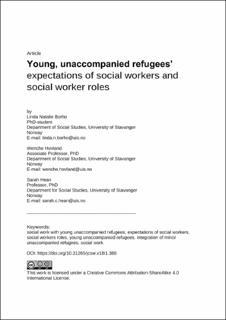| dc.contributor.author | Borho, Linda Natalie | |
| dc.contributor.author | Hovland, Wenche | |
| dc.contributor.author | Hean, Sarah Catherine Patricia Duff | |
| dc.date.accessioned | 2023-07-12T11:21:39Z | |
| dc.date.available | 2023-07-12T11:21:39Z | |
| dc.date.created | 2023-07-10T14:55:45Z | |
| dc.date.issued | 2023-06 | |
| dc.identifier.citation | Borho, L. N., Hovland, W., & Hean, S. (2023). Young, unaccompanied refugees’ expectations of social workers and social worker roles. Journal of Comparative Social Work, 18(1), 34–59. | en_US |
| dc.identifier.issn | 0809-9936 | |
| dc.identifier.uri | https://hdl.handle.net/11250/3078250 | |
| dc.description.abstract | Background: Young people who have travelled to another country, unaccompanied and with refugee status, are a both resilient and vulnerable group with specific needs. Supporting them is often challenging for social workers, and providing this support is mediated by the expectations that these young people have of social workers and social worker roles.
Aim: In this study, we explore how young unaccompanied refugees (YURs) perceive the roles of social workers in the national context of Norway, where concerns about the quality of social work for this group have been highlighted.
Method: Using the theoretical lens of role theory, semi-structured in-depth interviews were conducted with 11 Afghan boys between 16 and 23 years of age, living under the protection of the Child Welfare Services (CWS) in two municipalities in Norway. The interviews explored the boys’ positive and negative experiences of the social worker. A thematic analysis was conducted, in which the coding framework was informed by the premise that actual experience informs our expectations of other individuals’ behaviour and roles.
Findings: YURs’ expectations are more than instrumental, and more than a task they expect the social worker to perform. They also expect the task to be performed in a person-centred, therapeutic alliance (e.g. with humour and trust), and that the social worker exhibits particular personal characteristics or competences, besides being culturally competent and sensitive.
Conclusion: We find that YURs’ descriptions of the social worker’s roles of being a caregiver and practical helper are similar to what other young people in contact with the CWS expect. However, YURs expect an additional role, which is specific to this field of social work, namely that of an integration helper. However, the expectations that each individual young person has of social workers are individual, in flux and contextual, and not consistent over time. Therefore, we recommend prioritizing learning more about the young person’s individual expectations of the social worker roles, as well as a useful weighting of these roles for each individual young refugee. | en_US |
| dc.language.iso | eng | en_US |
| dc.publisher | University of Stavanger | en_US |
| dc.rights | Navngivelse-DelPåSammeVilkår 4.0 Internasjonal | * |
| dc.rights.uri | http://creativecommons.org/licenses/by-sa/4.0/deed.no | * |
| dc.subject | flyktninger | en_US |
| dc.subject | enslige mindreårige flyktninger | en_US |
| dc.subject | refugees | en_US |
| dc.title | Young, unaccompanied refugees’ expectations of social workers and social worker roles | en_US |
| dc.type | Peer reviewed | en_US |
| dc.type | Journal article | en_US |
| dc.description.version | publishedVersion | en_US |
| dc.rights.holder | © 2023 Linda Natalie Borho, Wenche Hovland, Sarah Hean | en_US |
| dc.subject.nsi | VDP::Samfunnsvitenskap: 200::Sosialt arbeid: 360 | en_US |
| dc.source.pagenumber | 34-59 | en_US |
| dc.source.volume | 18 | en_US |
| dc.source.journal | Journal of Comparative Social Work | en_US |
| dc.source.issue | 1 | en_US |
| dc.identifier.doi | 10.31265/jcsw.v18i1.388 | |
| dc.identifier.cristin | 2161728 | |
| cristin.ispublished | true | |
| cristin.fulltext | postprint | |
| cristin.qualitycode | 1 | |

